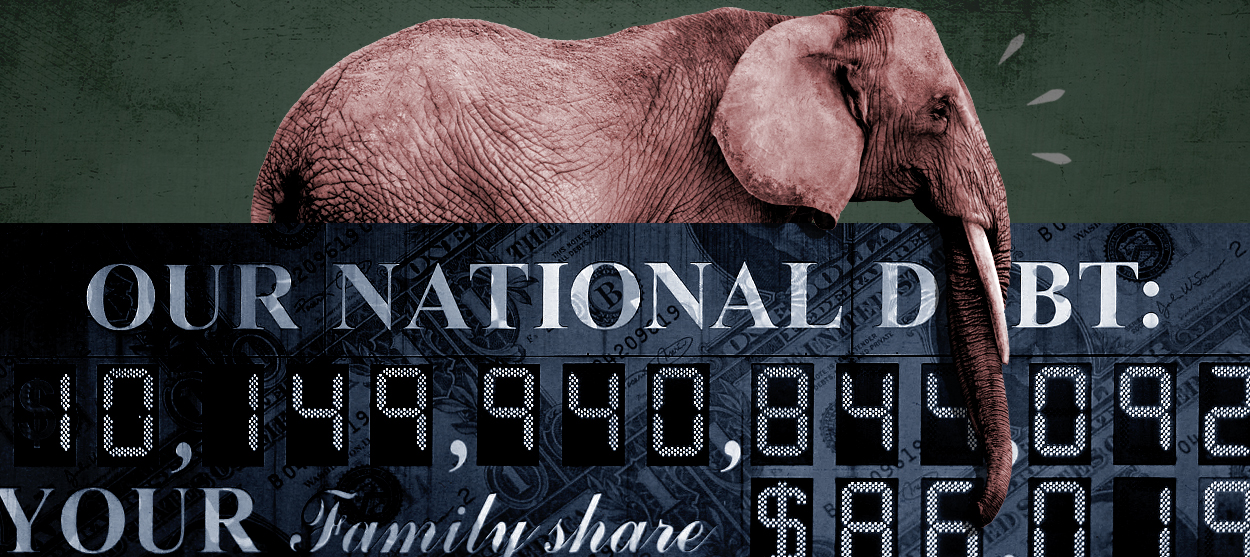Republicans' deficit hypocrisy comes home to roost
Have Republicans fully reckoned with the reality that they can no longer cry wolf on the deficit?


A free daily email with the biggest news stories of the day – and the best features from TheWeek.com
You are now subscribed
Your newsletter sign-up was successful
We've undergone a sea change in American politics. Its significance should not be underrated. The Republican Party has, for the foreseeable future, lost all credibility on the issue of federal spending and deficits. It's a rare case of ideological hypocrisy, of practice never conforming to theory, coming home to roost.
The Congressional Budget Office (CBO) estimates that the federal government will this fiscal year spend $2.3 trillion more than it collects in revenue — and that's before President Biden's $1.9 trillion COVID relief proposal is taken into account. CBO estimates further that, in 10 years, we'll reach the highest debt-to-GDP-ratio in U.S. history. By any reasonable measure, that's a lot of red ink. Those kinds of numbers, not long ago, would have alarmed even most Democrats and nonpartisan economists, as well as Republicans.
Consider, for time-capsule context, this New York Times dispatch from Washington in 2009, when it was considered axiomatically, no-need-to-explain-it true that deficits needed to be reined in:
The Week
Escape your echo chamber. Get the facts behind the news, plus analysis from multiple perspectives.

Sign up for The Week's Free Newsletters
From our morning news briefing to a weekly Good News Newsletter, get the best of The Week delivered directly to your inbox.
From our morning news briefing to a weekly Good News Newsletter, get the best of The Week delivered directly to your inbox.
The Obama administration said Friday that the federal deficit for the fiscal year that just ended was $1.4 trillion, nearly a trillion dollars greater than the year before and the largest shortfall relative to the size of the economy since 1945. … The number, while lower than forecast a few months ago, underscored the challenges ahead in shrinking the deficit even as the White House and Congress are considering more steps to stimulate an economy that is making a slow recovery. The political hurdles to finding a solution were evident on Friday as each political party immediately blamed the other for the growth of the deficit. [The New York Times]
Yet the decibel level of political panic over debt and deficits today is somewhere between a babbling brook and the proverbial #Crickets.
Sure, there are still Blue Dog Democrats roaming the halls of Congress. And a gang of 10 GOP senators met with President Biden last month urging bipartisan cooperation on a smaller COVID relief package. They sang familiar notes of deficit hawkery. "At a time of unprecedented deficits and debt … we need to be sure that this is targeted," said Sen. Rob Portman (Ohio). But this felt like a rote effort; like Republican karaoke.
How did this happen?
One reason is that the passion on the right very clearly resides now in the social arena: cancel culture, permissible speech on Big Tech platforms, religious liberty, transgender rights. And of course there's the legacy of Donald Trump. As Jill Lawrence writes, Trump's administration trashed Republican credibility on a host of issues, not limited to deficits: e.g., the rule of law, patriotism, support for police.
A free daily email with the biggest news stories of the day – and the best features from TheWeek.com
But Republican bad faith on deficits has a long history; in this instance, for once, Trump was exactly like his co-partisan predecessors. When they are out of power, Republicans rail against deficits. When they are in power, they cut taxes and increase spending (giving the lie to claims that it's spending, not deficits per se, that really bugs them). It happened under Ronald Reagan. It happened under George W. Bush. And it happened under Donald Trump. The lone exception to this pattern was the administration of George H.W. Bush, who struck a bargain with Democrats to raise taxes and cut spending to reduce the deficit; it also instituted "pay as you go" budget rules to further constrain Congress from deficit-financing both new spending or tax cuts. It worked! And for this act of fiscal rectitude, the first President Bush was permanently vilified by the likes of Grover Norquist and the late Rush Limbaugh. This supposed betrayal of bedrock conservative principles has warped our politics ever since.
By the time Obama came along, Republicans' false pretense of fiscal conservatism should have been clear to anyone with eyes to see it. But the myths persisted. Democrats kept playing the same mug's game that President Clinton had: that is, taking Republican rhetoric about debt and deficits at face value. In July 2011, author Michael Cohen was practically banging his head on his desk at the madness of sequestration and fiscal cliffs:
Obama floats proposals to shrink the welfare state to take the deficit and government spending off the table — even as polling data and empirical research show that voters aren't interested in deficit reduction and don't punish presidents for increasing the deficit. … That he, a progressive Democrat, is prostrating himself at the altar of fiscal responsibility and offering cuts to cherished Democratic programs suggests how distorted U.S. fiscal debates have become … One party preaches responsibility and never delivers. The other party delivers fiscal responsibility to avoid charges of deficit fickleness from the other, profligate party. [Politico]
Things have changed, dramatically, since 2011.
The same Joe Biden who cheerfully cut a budget deal with Sen. Mitch McConnell in January 2013 is now full-steam-ahead committed to a massive, deficit-financed relief package, on top of two packages enacted last year. "Every major economist thinks we should be investing in deficit spending in order to generate economic growth," Biden said shortly before he was inaugurated. To be sure, the politics of a pandemic are unique. But the parting of the Deficit Scold Sea owes as much to a rejection of the aforementioned litany of bad faith as it does to economic urgency.
Beyond politics, the profession of economics, too, seems to internalized the lessons of the recent past. An environment of low interest rates as far as the eye can see, paired with market expectations for more spending and stimulus; persistently low inflation; the belief, now mainstream, that the Obama-era labor market recovery was relatively slow because the federal government didn't run deficits like it later would under Trump — all this has instilled confidence in Democrats that they don't need to listen to the old strictures. It also means Republicans are no longer getting air cover from most mainstream economists.
For his part, Bruce Bartlett, the ex-Republican budget expert, believes this respite from traditional debt-and-deficit politics won't last forever. He points to the likes of economist Larry Summers, the notorious skunk in the garden party of progressivism, and his prediction that the Federal Reserve may be forced to hike interest rates next year. "Sooner or later, interest rates are going to rise, and even if they are still well below historical levels everyone is going to have a cow," Bartlett says via email. "Higher rates mean huge losses for bond holders and induce panic among realtors and others who sell on credit. That means a huge built-in constituency for deficit reduction. When? I don't know. But when the time comes it will be bipartisan."
All of which is compelling Democrats to spend every drop of excess fiscal capacity while they can.
For now, deficits really don't matter.
Scott Galupo is a freelance writer living in Virginia. In addition to The Week, he blogs for U.S. News and reviews live music for The Washington Post. He was formerly a senior contributor to the American Conservative and staff writer for The Washington Times. He was also an aide to Rep. John Boehner. He lives with his wife and two children and writes about politics to support his guitar habit.
